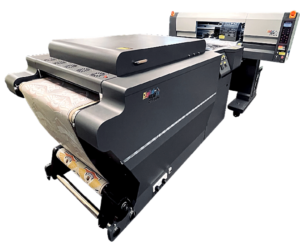Starting a t-shirt printing business is straightforward and requires minimal equipment. The main item required to get your business up and running is an dtf printer epson . With the Epson DTF printer, you can create custom designs for customers and print them on T-shirts quickly and easily.

Epson DTF Printer – The Star Of The Show
The Epson DTF printer offers excellent results with a low cost of entry. It’s a Direct-To-Fabric printer, meaning that it prints directly onto fabric, eliminating the need for transfer paper or other materials. It prints with a combination of water-based inks and heat setting so the textiles are durable and long lasting. The print quality is excellent, with smooth gradients and sharp details.
Using the Epson DTF printer you can print designs on a variety of different fabrics such as cotton, polyester and nylon. It can also handle delicate fabrics such as silk and satin without compromising the image. You can increase production efficiency by using multiple platen clips to hold multiple t-shirts at once. With two platen clips you can print two t-shirts at a time and reduce the amount of time spent changing each shirt out.
Software Tools For Maximum Efficiency
Having the right software tools is crucial for designing and producing t-shirt designs quickly and efficiently. You’ll want to invest in one of the many t-shirt design programs available. These programs allow you to create your own artwork, or use existing artwork from stock media libraries and clip art galleries. You can then apply text, images, gradients and special effects to your artwork and save it as a vector file that is compatible with the Epson DTF printer.
Another useful tool is a RIP (Raster Image Processor) software program. This type of program will help ensure accurate color reproduction and efficient printing times. Some RIP software programs allow you to manage multiple jobs and integrate with other software programs.
Equipment For Pre & Post-Printing Processes
In addition to the Epson DTF printer you’ll need some additional equipment for the pre and post-printing processes. You’ll need a cutting table to accurately cut each t-shirt to the correct size and shape. You’ll also need an industrial heat press to securely attach the fabric to the garment. A dryer or curing oven may also be necessary depending on the fabric and ink you’re working with. In addition, some businesses might opt for automatic DTG (Direct to Garment) machines which have a more automated process and higher production rate.
Finding The Right Supplies
Once you’ve got the right equipment, you’ll need to purchase the necessary supplies. You’ll need blank garments such as t-shirts, hoodies, hats and bags that you can print on. You’ll also need the appropriate substrates such as vinyl, transfer paper, canvas and other types of fabric. Lastly, you’ll need the appropriate inks and chemicals to make sure your prints stick firmly to the garments and last for years.
Promotional Strategies
Finally, you’ll need to come up with a promotional strategy. You can promote your services through social media platforms, online marketplace sites, or by word-of-mouth. You’ll also need to make sure you have an accessible online presence so customers can find you easily and place orders. A website and blog are great ways to showcase your portfolio and build your brand identity.
Starting a t-shirt printing business can be a fun and profitable venture. With the right equipment and supplies, you’ll be on your way to creating amazing t-shirt designs and printing them quickly and easily. The Epson DTF printer is a great way to get started, offering excellent print quality and fast production speeds.
